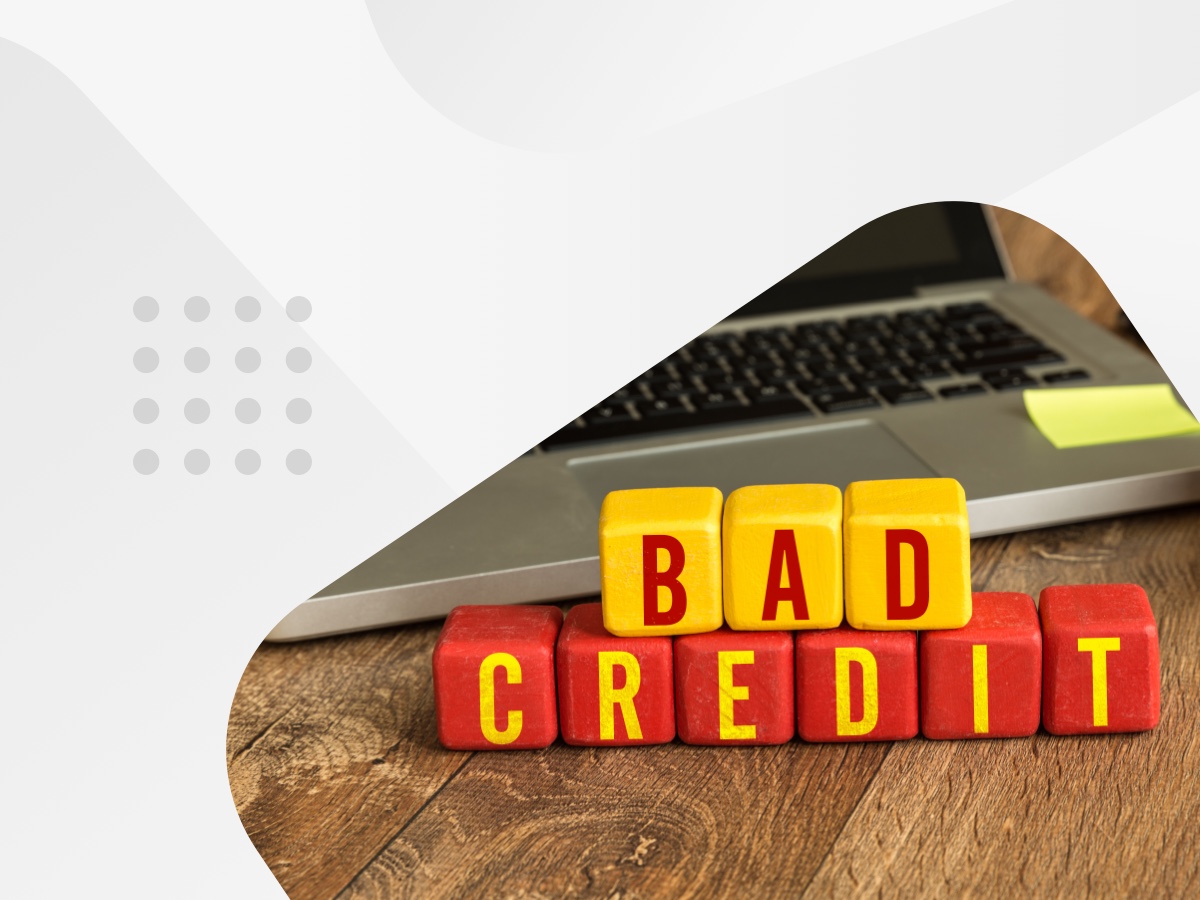
The credit rating bureaus and agencies have different tiers of credit risk that they assign to you within your credit file, according to your credit score. Typically, an individual or company applying for credit would want a score within the ‘average’ tier at a minimum, with a preference to be higher.
Therefore a bad credit score, or bad credit rating, may be perceived as one that is below the ‘average’ tier. You’re more likely to be approved for credit products if your credit score sits in the ‘good’ to ‘excellent’ range.
A credit score is a numerical measurement of your creditworthiness and indicates to creditors your ability to pay bills, loans, and other debts on time and in full. When seeking approval for a credit application, whether through business or as an individual, the creditor may conduct an enquiry on your credit file to reveal your score. This score will then factor into their decision to approve the credit application, alongside any in-house due diligence.
Credit scores inform banks, trading partners, or service providers of an individual or company’s ability to service credit products, including:
- Credit cards
- Utility bills
- Company Credit
- Personal loans
- Home loans
- Business loans
- Mobile phone plans
- Repayments for goods
When you submit a credit application, the creditor (bank, utility company, trading partner etc.) may conduct either a ‘hard’ enquiry or ‘soft’ enquiry of your credit file. This reveals your score and gives them an indication of your reliability as a debtor.
- A ‘hard’ enquiry will be recorded on your credit file for future reference. If too many are conducted over a short space of time, it may indicate that you are ‘credit hungry’ and overly enthusiastic in your credit applications. Some banks and organisations will be more likely to reject credit applications if they observe too many hard enquiries on your file, especially within a short period. Therefore, it may be worth carefully considering your aptitude and qualification for a credit product prior to applying. It is also recommended to apply for lines of credit one at a time.
- A ‘soft’ enquiry reveals the same credit score information, however, the enquiry will not be reflected in the history of your credit file. Some organisations, such as Afterpay, only conduct soft inquiries to mitigate negatively affecting the creditworthiness of applicants. Before applying for any credit product it may be worthwhile checking which kind of credit file check is conducted, in order to assess the potential ramifications for you as the debtor.
The higher the value of the debt you are applying for, the lower risk you’ll need to be as a customer. For example, if applying for a small loan or utility service, some providers may accept applications from customers with a riskier or low credit score, as the value of the credit being applied for is relatively low.
By contrast, if applying for high-value credit, such as a mortgage, your credit score will more likely need to be in the ‘Very Good’ to ‘Excellent’ range. This is because the exposure to the lender is higher, and your default may have greater ramifications.
Credit scores for businesses and individuals have the same purpose: to determine the creditworthiness of the applicant. However, they do not reflect each other, as an applicant business is an entirely different entity to an applicant individual, with a different capacity to service debt. The scores are effectively unrelated, although some instances such as personal bankruptcy may factor into your business credit score. A below average credit score in this instance may be one that sits in the ‘600’ range. The lowest credit score you may receive is one that is close to zero, which is common for those with significant adverse events in their history.
You have multiple credit scores as a business or individual, conducted by different bureaus and agencies. Each credit reporting body has its own scale, and analyses a customer according to its own unique data sets. Your score with one bureau or agency is not indicative of your score with them all. Certain events may only be on file with certain reporting bodies, and they update credit histories at separate time points, resulting in potentially large differences in your credit score from one to the next.
There are three credit reporting bureaus for individuals within Australia – Experian, Equifax and Illion (formerly Dun and Bradstreet). Their bands of credit risk are as follows:
| Experian | Equifax | Illion | |
|---|---|---|---|
| Excellent | 800-1000 | 833-1200 | 800-1000 |
| Very Good | 700-799 | 726-832 | 700-799 |
| Good | 625-699 | 622-725 | 500-699 |
| Average | 550-624 | 510-621 | 300-499 |
| Below Average | 0-549 | 0-509 | 0-299 |
For businesses, the reporting bodies are more widely varied. With CreditorWatch being the only one to specialise in B2B credit scores. When seeking to check the creditworthiness of an applicant business, the credit reporting suite from CreditorWatch, inclusive of RiskScore, provides the highest quality debtor analysis available to the market.
According to three extensive subsets of trade payment, behavioural and demographic data, the credit reporting suite utilises machine-learning to deliver highly informed and accurate credit risk information to empower businesses in their credit approval decision-making and reduce their exposure to bad debt.
Credit Rating Risk Category Recommendation
A1, A2, A3 Very Low Entity has a very strong aptitude to meet credit commitments. Extend terms within consideration.
B1, B2 Low Entity has a strong aptitude to meet credit commitments. Unfavourable economic conditions may lead to a weakened capability to meet financial commitments. Extend terms within consideration
B3, C1 Neutral Entity currently has the aptitude to meet credit commitments. Unfavourable business, financial, or economic conditions may impair ability to meet financial commitments. Extend terms and monitor ongoing payment behaviour.
C2 Acceptable Entity has an adequate aptitude to meet credit commitments. Unfavourable business, financial, or economic conditions will likely impair the capacity or willingness to meet financial commitments. Extend terms, closely monitor ongoing payment behaviour.
C3 Borderline Entity is vulnerable and the aptitude to meet credit commitments is dependent upon favourable business, financial, and economic conditions. Trade with caution, closely monitor and consider your payment terms.
D1, D2, D3 High Entity is currently highly vulnerable. COD trading is highly recommended.
E Impaired Entity is currently highly vulnerable to non-payment and default. Trading eligibility must be considered.
F Default Entity has become insolvent or does not have the ability to trade.
Each credit reporting body has its own specific set of variables that affect the credit score of a business or individual, resulting in different credit scores from one to the next. There are some consistencies though. Some of the regular factors that play into a credit score include:
- The number of hard credit enquiries on your credit file over time
- Any credit products you’ve already applied for
- The credit limits for each product
- Repayment history, including late payments (exceeding 14 days)
- Adverse events, such as payment defaults, ASIC notices etc.
There are a number of adverse events that may negatively impact a credit file over time. The length that each event stays on file is weighted according to how serious it is considered to be when making future assessments.
For individuals:
- Repayment history – two years
- Credit enquiries and applications – five years
- Writs, summons and court judgements – five years
- Payment defaults – five years
- Bankruptcies, debt agreements and personal insolvency agreements – 7 years
For businesses:
- Repayment history – two years
- Credit enquiries, payment defaults and court judgements – five years
- Overdue accounts listed as infringements – seven years
Wondering how to fix a credit rating or clear bad credit history? While it may take time, clearing a credit score could require following these steps:
- Check for mistakes on your file – Make sure that all of the information provided on your file is accurate and relevant. Should there be a mistake, be sure to flag it with the reporting body immediately. You’d be surprised how common errors are, and how they can transform your credit file into a bad credit report.
- Grow your savings – Regular deposits into your savings account are an indicator of your responsibility with money. Thanks to the implementation of Comprehensive Credit Reporting (CCR), positive information like this is now being shared by banks and lenders, elevating your creditworthiness.
- Meet your repayments – Late payments will quickly lead to the deterioration of your credit score. Set reminders in order to meet all repayments before they’re due, and avoid the prospect of default at all costs.
- Pay off your debts – If you have outstanding loans, such as a personal loan or a business loan, consider taking steps to ensure that these are paid off as soon as possible, as they can result in a low credit rating. Reducing your exposure to debts and liabilities will improve your credit score over time.
- Don’t cut up your credit card just yet – Like many Australians, you may hold the belief that ditching a credit card product will improve your credit score. Actually, the truth is that using a credit card responsibly – paying off your balance in full each statement period – is actually a positive indicator of creditworthiness, especially considering CCR.
Checking your individual credit score can be as simple as registering with any of the credit reporting bureaus online. You are entitled to a free copy of your credit file once every three months.
For businesses, it may be worth considering a free trial with CreditorWatch’s Credit Reporting Tools to not only gain insight into the creditworthiness of potential debtors but also to manage them efficiently and effectively once their application is approved.
If you’d like to learn more about how to safeguard your business from risky debtors, using the latest technology available to Australian businesses, speak to our team today.
What is a bad credit score for a business?
According to CreditorWatch’s RiskScore data, if your company score sits in our D-F range, you may have a poor credit score, and be less likely to gain approval for a business loan.
What is a bad credit score for buying a car?
If you’re wondering what is a bad credit score for a car loan, this will depend on if it is being purchased for an individual or a business. For individuals, a bad credit score that may limit your chances of approval for vehicle finance is one that is realistically below 600. For companies, this may be one that sits in CreditorWatch’s RiskScore range of D-F.
What is a bad credit score for a mortgage?
A bad credit score for a mortgage would be one that sits in any of the three major credit reporting bureaus ‘bad’ to ‘average’ range. Keep in mind that a credit score does not weigh as heavily on an individual’s ability to take out a home loan as it does, say, a credit card or personal loan. A ‘good’ to ‘excellent’ credit score is still more likely to boost your approval, but having a large deposit and meeting other requirements will as well, as home loan terms are typically 20-30 years long – meaning your credit score is likely to fluctuate in this time.
What is a DUNS number?
A DUNS (Data Universal Numbering System) number is a unique 9-digit business identification number developed by Dun and Bradstreet, known domestically as illion. It assists some creditors globally in identifying entities in order to determine details such as legal status. Within Australia, credit-checking trading partner businesses can be as simple as an ABN or ACN search within our CreditorWatch credit reporting platform.
The system was developed to help standardise credit reporting internationally – allocating a unique, globally recognised identifier that other parties could use to look up that business. They may access a DUNS certificate as part of their credit application due diligence, or to inform trading decisions moving forwards.
A company’s head office can apply for a Dun and Bradstreet number, as well one for as each physical location where business is conducted – as it is site-specific. For example, if you have a restaurant franchise model, each franchisee would be able to apply for a DUNS number.
Some international businesses and programs may require a business to apply for a DUNS number prior to the commencement of trading, as it forms a component of their risk analysis.
If you wish for your business to participate in Apple’s Development Program, for example, this is a requirement. Other services, such as Google Ads, may ask for a DUNS number to assist them in assessing your application for a monthly invoicing payment setting. It is not a prerequisite for forming a company in Australia.
For Australian businesses, a DUNS number is totally unnecessary in order to conduct credit reporting and risk analysis. There are already unique identifiers known as your Australian Business Number (ABN) or Australian Company Number (ACN) registered with the Australian Business Register (ABR).
These identifiers are perfectly satisfactory when aiming to identify, credit check and monitor client businesses – no DUNS number or 1300 number is needed. You can search Australian Company Number information on the Australian Securities and Investment Commission’s registers.
A current or prospective trading partner’s ABN or ACN is all your company requires to check its creditworthiness and probability of default, leveraging the sophisticated machine-learning capabilities from CreditorWatch. Our extensive data encompasses 10 million trade lines from over 55,000 customers direct from Xero, MYOB and Aged Trial Balances (ATBs), allowing us to produce over 18 million insightful credit reports since 2010.
Get started with CreditorWatch today
Take your credit management to the next level with a 14-day free trial.

